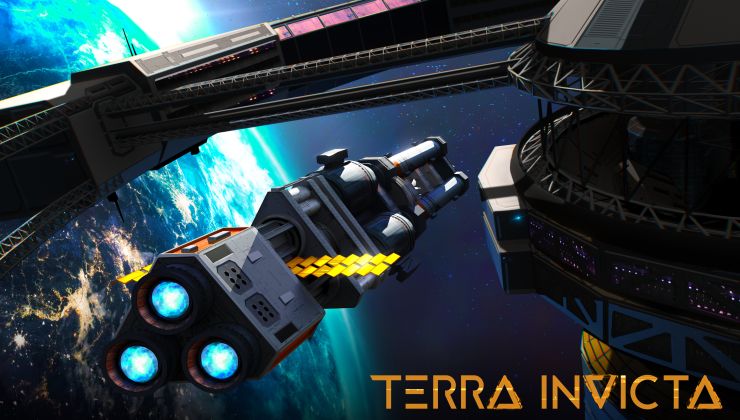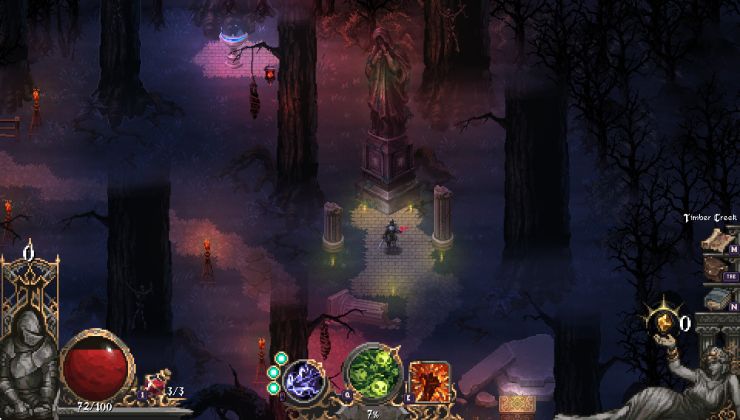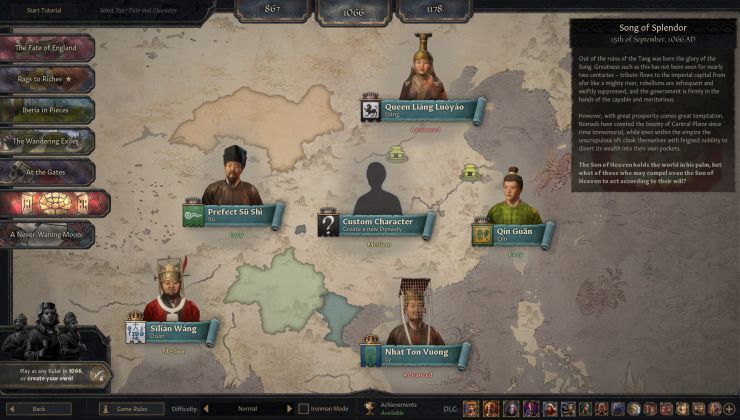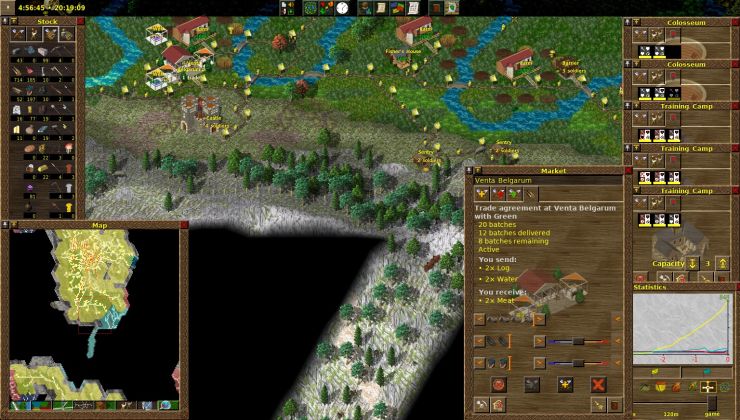I decided to take a look at this Vulkan nonsense with The Talos Principle, since I hadn't actually tried it yet myself. Here are some benchmarks done on my 980ti. I will look to do some on my 970 if people want to see them too.
Tested across two different driver versions, both at 4K and 1080p using the built-in benchmark tool. This is using the beta version of Talos, not the stable version.
From my observations Vulkan seems smoother, with little to no hitching/stutters, where as OpenGL did show some notable hitching/stutters for brief moments.
It seems that the Steam Overlay brings down the overall Vulkan performance if something is using it. If you have the FPS counter on, or you get notifications the Vulkan performance will go down. For best results, turn it off. Valve are aware of the Steam Overlay rendering issue.
Test done on Intel i7, Nvidia 980ti, 16GB RAM, standard hard drive for the game as my SSD is used for my OS. You can click each spoiler section for the full benchmark log from the game.
Game settings for all tests:
2x MSAA
CPU Speed: Ultra
GPU Speed: High
GPU Memory: Ultra
Level Caching: High
Tests with Steam Overlay turned off
364.16
4K
Vulkan Average: 114.4 FPS (115.9 w/o extremes)
OpenGL Average: 92.1 FPS (99.4 w/o extremes)
1080p
Vulkan Average: 134.1 FPS (136.1 w/o extremes)
OpenGL Average: 102.0 FPS (110.3 w/o extremes)
See Page 2 for tests with Steam Overlay turned on.
Tested across two different driver versions, both at 4K and 1080p using the built-in benchmark tool. This is using the beta version of Talos, not the stable version.
From my observations Vulkan seems smoother, with little to no hitching/stutters, where as OpenGL did show some notable hitching/stutters for brief moments.
It seems that the Steam Overlay brings down the overall Vulkan performance if something is using it. If you have the FPS counter on, or you get notifications the Vulkan performance will go down. For best results, turn it off. Valve are aware of the Steam Overlay rendering issue.
Test done on Intel i7, Nvidia 980ti, 16GB RAM, standard hard drive for the game as my SSD is used for my OS. You can click each spoiler section for the full benchmark log from the game.
Game settings for all tests:
2x MSAA
CPU Speed: Ultra
GPU Speed: High
GPU Memory: Ultra
Level Caching: High
Tests with Steam Overlay turned off
364.16
4K
Vulkan Average: 114.4 FPS (115.9 w/o extremes)
Spoiler, click me
20:40:40 INF: Gfx API: Vulkan
20:40:40 INF: Duration: 60.0 seconds (6861 frames)
20:40:40 INF: Average: 114.4 FPS (115.9 w/o extremes)
20:40:40 INF: Extremes: 323.8 max, 34.5 min
20:40:40 INF: Sections: AI=6%, physics=3%, sound=1%, scene=68%, shadows=14%, misc=8%
20:40:40 INF: Highs: 540 in 3.6 seconds (148.6 FPS)
20:40:40 INF: Lows: 643 in 7.4 seconds (87.2 FPS)
20:40:40 INF: > 60 FPS: 100%
20:40:40 INF: Duration: 60.0 seconds (6861 frames)
20:40:40 INF: Average: 114.4 FPS (115.9 w/o extremes)
20:40:40 INF: Extremes: 323.8 max, 34.5 min
20:40:40 INF: Sections: AI=6%, physics=3%, sound=1%, scene=68%, shadows=14%, misc=8%
20:40:40 INF: Highs: 540 in 3.6 seconds (148.6 FPS)
20:40:40 INF: Lows: 643 in 7.4 seconds (87.2 FPS)
20:40:40 INF: > 60 FPS: 100%
OpenGL Average: 92.1 FPS (99.4 w/o extremes)
Spoiler, click me
20:45:11 INF: Gfx API: OpenGL
20:45:11 INF: Duration: 60.0 seconds (5527 frames)
20:45:11 INF: Average: 92.1 FPS (99.4 w/o extremes)
20:45:11 INF: Extremes: 237.9 max, 27.4 min
20:45:11 INF: Sections: AI=5%, physics=1%, sound=1%, scene=71%, shadows=15%, misc=6%
20:45:11 INF: Highs: 545 in 3.6 seconds (152.7 FPS)
20:45:11 INF: Lows: 859 in 14.9 seconds (57.5 FPS)
20:45:11 INF: 30-60 FPS: 8%
20:45:11 INF: > 60 FPS: 92%
20:45:11 INF: Duration: 60.0 seconds (5527 frames)
20:45:11 INF: Average: 92.1 FPS (99.4 w/o extremes)
20:45:11 INF: Extremes: 237.9 max, 27.4 min
20:45:11 INF: Sections: AI=5%, physics=1%, sound=1%, scene=71%, shadows=15%, misc=6%
20:45:11 INF: Highs: 545 in 3.6 seconds (152.7 FPS)
20:45:11 INF: Lows: 859 in 14.9 seconds (57.5 FPS)
20:45:11 INF: 30-60 FPS: 8%
20:45:11 INF: > 60 FPS: 92%
1080p
Vulkan Average: 134.1 FPS (136.1 w/o extremes)
Spoiler, click me
20:51:16 INF: Gfx API: Vulkan
20:51:16 INF: Duration: 60.0 seconds (8042 frames)
20:51:16 INF: Average: 134.1 FPS (136.1 w/o extremes)
20:51:16 INF: Extremes: 317.6 max, 18.3 min
20:51:16 INF: Sections: AI=7%, physics=2%, sound=1%, scene=67%, shadows=15%, misc=8%
20:51:16 INF: Highs: 789 in 4.8 seconds (164.9 FPS)
20:51:16 INF: Lows: 1050 in 9.6 seconds (109.2 FPS)
20:51:16 INF: > 60 FPS: 100%
20:51:16 INF: Duration: 60.0 seconds (8042 frames)
20:51:16 INF: Average: 134.1 FPS (136.1 w/o extremes)
20:51:16 INF: Extremes: 317.6 max, 18.3 min
20:51:16 INF: Sections: AI=7%, physics=2%, sound=1%, scene=67%, shadows=15%, misc=8%
20:51:16 INF: Highs: 789 in 4.8 seconds (164.9 FPS)
20:51:16 INF: Lows: 1050 in 9.6 seconds (109.2 FPS)
20:51:16 INF: > 60 FPS: 100%
OpenGL Average: 102.0 FPS (110.3 w/o extremes)
Spoiler, click me
20:55:04 INF: Gfx API: OpenGL
20:55:04 INF: Duration: 60.0 seconds (6118 frames)
20:55:04 INF: Average: 102.0 FPS (110.3 w/o extremes)
20:55:04 INF: Extremes: 280.9 max, 24.8 min
20:55:04 INF: Sections: AI=5%, physics=2%, sound=1%, scene=69%, shadows=17%, misc=6%
20:55:04 INF: Highs: 600 in 3.6 seconds (165.3 FPS)
20:55:04 INF: Lows: 942 in 14.9 seconds (63.4 FPS)
20:55:04 INF: 30-60 FPS: 5%
20:55:04 INF: > 60 FPS: 95%
20:55:04 INF: Duration: 60.0 seconds (6118 frames)
20:55:04 INF: Average: 102.0 FPS (110.3 w/o extremes)
20:55:04 INF: Extremes: 280.9 max, 24.8 min
20:55:04 INF: Sections: AI=5%, physics=2%, sound=1%, scene=69%, shadows=17%, misc=6%
20:55:04 INF: Highs: 600 in 3.6 seconds (165.3 FPS)
20:55:04 INF: Lows: 942 in 14.9 seconds (63.4 FPS)
20:55:04 INF: 30-60 FPS: 5%
20:55:04 INF: > 60 FPS: 95%
See Page 2 for tests with Steam Overlay turned on.
Some you may have missed, popular articles from the last month:
All posts need to follow our rules. Please hit the Report Flag icon on any post that breaks the rules or contains illegal / harmful content. Readers can also email us for any issues or concerns.
I will wait the 970 one
0 Likes
Article updated, xpander noted to me in the IRC that Steam Overlay brings the performance down.
I have re-done some tests with Steam Overlay turned off. Page 2 hosts the Steam Overlay on benchmarks.
I have re-done some tests with Steam Overlay turned off. Page 2 hosts the Steam Overlay on benchmarks.
2 Likes
Nice to see Vulcan out-performing OpenGL.
On a related note, I had no idea that Steam overlay had such a huge impact on performance!
On a related note, I had no idea that Steam overlay had such a huge impact on performance!
1 Likes
Well, Croteam themselves said that for now OpenGL is faster, because Vulkan is just so new. I am no graphics programmer, but I would guess that their Vulkan renderer is far from optimal, simply because you cannot make optimal solutions in a technology that you just got your hand on for the first time. It's not like there are any real best practice examples you can lear from.
Personally I think the results are encouraging. Properly bechmarking stuff is hard, and plus minus 10 FPS may not mean anything more than that they do the things that are being measured differently.
Personally I think the results are encouraging. Properly bechmarking stuff is hard, and plus minus 10 FPS may not mean anything more than that they do the things that are being measured differently.
2 Likes
We're seeing between 22-32FPS difference here depending on the resolution. Vulkan is performing better than OpenGL for it already (for my 980ti at least). That's really encouraging.
Don't know if you were writing that comment before seeing the updated article or not.
Hopefully sometime Valve will look into what's causing the Steam Overlay to bring down Vulkan performance.
Don't know if you were writing that comment before seeing the updated article or not.
Hopefully sometime Valve will look into what's causing the Steam Overlay to bring down Vulkan performance.
0 Likes
Yes, I just saw the updates now. Nice to see Vulkan doing well, but my point is still valid. Bechmarking stuff is hard, and you have to be careful not to compare apples to oranges.
There is more to graphics than FPS. It is just as important when you do rendering (synchronisation), how much it varies, and so on.
I guess the most important thing here is that Vulkan is performing well already, and there is place for improvements in the future.
There is more to graphics than FPS. It is just as important when you do rendering (synchronisation), how much it varies, and so on.
I guess the most important thing here is that Vulkan is performing well already, and there is place for improvements in the future.
0 Likes
Nice to see it outperforming OpenGL (was there any doubt that it would btw.?) But the much more important question is...will it outperform DX12? Because if it doesn't devs will go "Why would we add a Vulkan render path for these 1% that use Linux?" To succeed on the market, being the second fastest API won't be good enough when the fastest one already controls 90% of the market.
1 Likes
Good catch xpander!
I have the same fps drop with Steam Overlay enabled and Vulkan.
OS: Debian 8.4 (Jessie) - 3.16.0-4-amd64
CPU: i5 3570K
RAM: 8GB
GPU: Nvidia 660GTX - 364.15
Steam Overlay enabled: OpenGL 82fps - Vulkan 58fps
Steam Overlay disabled: OpenGL 83fps - Vulkan 107fps
Almost doubled! and now vulkan is better than OpenGL
Last edited by Nel on 13 Apr 2016 at 8:29 pm UTC
I have the same fps drop with Steam Overlay enabled and Vulkan.
OS: Debian 8.4 (Jessie) - 3.16.0-4-amd64
CPU: i5 3570K
RAM: 8GB
GPU: Nvidia 660GTX - 364.15
Steam Overlay enabled: OpenGL 82fps - Vulkan 58fps
Steam Overlay disabled: OpenGL 83fps - Vulkan 107fps
Almost doubled! and now vulkan is better than OpenGL
Spoiler, click me
### OpenGL with Steam Overlay
21:24:48 INF: - benchmark results -
21:24:48 INF:
21:24:48 INF: Gfx API: OpenGL
21:24:48 INF: Duration: 59.0 seconds (4859 frames)
21:24:48 INF: Average: 82.4 FPS (88.1 w/o extremes)
21:24:48 INF: Extremes: 150.2 max, 4.6 min
21:24:48 INF: Sections: AI=6%, physics=2%, sound=1%, scene=63%, shadows=22%, misc=6%
21:24:48 INF: Lows: 240 in 6.5 seconds (36.7 FPS)
21:24:48 INF: < 20 FPS: 1%
21:24:48 INF: 30-60 FPS: 12%
21:24:48 INF: > 60 FPS: 87%
### Vulkan with Steam Overlay
21:14:43 INF: - benchmark results -
21:14:43 INF:
21:14:43 INF: Gfx API: Vulkan
21:14:43 INF: Duration: 60.0 seconds (3488 frames)
21:14:43 INF: Average: 58.1 FPS (59.8 w/o extremes)
21:14:43 INF: Extremes: 91.5 max, 6.9 min
21:14:43 INF: Sections: AI=5%, physics=1%, sound=1%, scene=78%, shadows=9%, misc=6%
21:14:43 INF: Highs: 18 in 0.2 seconds (88.9 FPS)
21:14:43 INF: Lows: 76 in 3.0 seconds (25.2 FPS)
21:14:43 INF: 30-60 FPS: 49%
21:14:43 INF: > 60 FPS: 50%
### OpenGL without Steam Overlay
22:09:25 INF: - benchmark results -
22:09:25 INF:
22:09:25 INF: Gfx API: OpenGL
22:09:25 INF: Duration: 60.0 seconds (5001 frames)
22:09:25 INF: Average: 83.4 FPS (90.8 w/o extremes)
22:09:25 INF: Extremes: 151.7 max, 33.8 min
22:09:25 INF: Sections: AI=6%, physics=2%, sound=1%, scene=62%, shadows=22%, misc=7%
22:09:25 INF: Highs: 510 in 4.1 seconds (124.6 FPS)
22:09:25 INF: Lows: 966 in 17.1 seconds (56.6 FPS)
22:09:25 INF: 30-60 FPS: 13%
22:09:25 INF: > 60 FPS: 87%
### Vulkan without Steam Overlay
22:06:56 INF: - benchmark results -
22:06:56 INF:
22:06:56 INF: Gfx API: Vulkan
22:06:56 INF: Duration: 60.0 seconds (6456 frames)
22:06:56 INF: Average: 107.6 FPS (111.0 w/o extremes)
22:06:56 INF: Extremes: 251.9 max, 7.9 min
22:06:56 INF: Sections: AI=8%, physics=3%, sound=1%, scene=64%, shadows=14%, misc=11%
22:06:56 INF: Highs: 92 in 0.5 seconds (203.7 FPS)
22:06:56 INF: Lows: 204 in 4.1 seconds (50.1 FPS)
22:06:56 INF: 30-60 FPS: 1%
22:06:56 INF: > 60 FPS: 99%
21:24:48 INF: - benchmark results -
21:24:48 INF:
21:24:48 INF: Gfx API: OpenGL
21:24:48 INF: Duration: 59.0 seconds (4859 frames)
21:24:48 INF: Average: 82.4 FPS (88.1 w/o extremes)
21:24:48 INF: Extremes: 150.2 max, 4.6 min
21:24:48 INF: Sections: AI=6%, physics=2%, sound=1%, scene=63%, shadows=22%, misc=6%
21:24:48 INF: Lows: 240 in 6.5 seconds (36.7 FPS)
21:24:48 INF: < 20 FPS: 1%
21:24:48 INF: 30-60 FPS: 12%
21:24:48 INF: > 60 FPS: 87%
### Vulkan with Steam Overlay
21:14:43 INF: - benchmark results -
21:14:43 INF:
21:14:43 INF: Gfx API: Vulkan
21:14:43 INF: Duration: 60.0 seconds (3488 frames)
21:14:43 INF: Average: 58.1 FPS (59.8 w/o extremes)
21:14:43 INF: Extremes: 91.5 max, 6.9 min
21:14:43 INF: Sections: AI=5%, physics=1%, sound=1%, scene=78%, shadows=9%, misc=6%
21:14:43 INF: Highs: 18 in 0.2 seconds (88.9 FPS)
21:14:43 INF: Lows: 76 in 3.0 seconds (25.2 FPS)
21:14:43 INF: 30-60 FPS: 49%
21:14:43 INF: > 60 FPS: 50%
### OpenGL without Steam Overlay
22:09:25 INF: - benchmark results -
22:09:25 INF:
22:09:25 INF: Gfx API: OpenGL
22:09:25 INF: Duration: 60.0 seconds (5001 frames)
22:09:25 INF: Average: 83.4 FPS (90.8 w/o extremes)
22:09:25 INF: Extremes: 151.7 max, 33.8 min
22:09:25 INF: Sections: AI=6%, physics=2%, sound=1%, scene=62%, shadows=22%, misc=7%
22:09:25 INF: Highs: 510 in 4.1 seconds (124.6 FPS)
22:09:25 INF: Lows: 966 in 17.1 seconds (56.6 FPS)
22:09:25 INF: 30-60 FPS: 13%
22:09:25 INF: > 60 FPS: 87%
### Vulkan without Steam Overlay
22:06:56 INF: - benchmark results -
22:06:56 INF:
22:06:56 INF: Gfx API: Vulkan
22:06:56 INF: Duration: 60.0 seconds (6456 frames)
22:06:56 INF: Average: 107.6 FPS (111.0 w/o extremes)
22:06:56 INF: Extremes: 251.9 max, 7.9 min
22:06:56 INF: Sections: AI=8%, physics=3%, sound=1%, scene=64%, shadows=14%, misc=11%
22:06:56 INF: Highs: 92 in 0.5 seconds (203.7 FPS)
22:06:56 INF: Lows: 204 in 4.1 seconds (50.1 FPS)
22:06:56 INF: 30-60 FPS: 1%
22:06:56 INF: > 60 FPS: 99%
Last edited by Nel on 13 Apr 2016 at 8:29 pm UTC
0 Likes
Quoting: KimyrielleNice to see it outperforming OpenGL (was there any doubt that it would btw.?) But the much more important question is...will it outperform DX12? Because if it doesn't devs will go "Why would we add a Vulkan render path for these 1% that use Linux?" To succeed on the market, being the second fastest API won't be good enough when the fastest one already controls 90% of the market.Definitely an important question. Seems like so far we're looking at rapid improvement, so good sign there. From what I've heard about how similar they are, though, I have this feeling they'll end up at rough parity.
I'm thinking if I were making the decision of DX12 vs Vulkan as someone wanting to sell a game (once Vulkan is properly off the ground), it would come down to "Do I want DX12 for Windows and Xbox, or Vulkan for Windows and (everything else)?" And probably my answer would be "I'll just use an engine that does both and get all of the above for almost free."
Last edited by Purple Library Guy on 13 Apr 2016 at 9:03 pm UTC
2 Likes
under ~/.local/share/vulkan/implicit_layer.d there is the steamoverlay for Vulkan, but I'm not sure how you would initialize it, I think at the game launch?
Aside from that, since Talos is still in development toward Vulkan I would assume the development layers are still in place. which in most regards will make Vulkan perform the same as DX11/OpenGL roughly. It's not until these development layers are removed will Vulkan actually show full performance capabilities.
Aside from that, since Talos is still in development toward Vulkan I would assume the development layers are still in place. which in most regards will make Vulkan perform the same as DX11/OpenGL roughly. It's not until these development layers are removed will Vulkan actually show full performance capabilities.
0 Likes
Quoting: Purple Library GuyThis to me is the answer. Whatever will reduce development time and give them easier platform options. Linux might be only 1% but android on the other hand...Quoting: KimyrielleNice to see it outperforming OpenGL (was there any doubt that it would btw.?) But the much more important question is...will it outperform DX12? Because if it doesn't devs will go "Why would we add a Vulkan render path for these 1% that use Linux?" To succeed on the market, being the second fastest API won't be good enough when the fastest one already controls 90% of the market.Definitely an important question. Seems like so far we're looking at rapid improvement, so good sign there. From what I've heard about how similar they are, though, I have this feeling they'll end up at rough parity.
I'm thinking if I were making the decision of DX12 vs Vulkan as someone wanting to sell a game (once Vulkan is properly off the ground), it would come down to "Do I want DX12 for Windows and Xbox, or Vulkan for Windows and (everything else)?" And probably my answer would be "I'll just use an engine that does both and get all of the above for almost free."
0 Likes
Quoting: GuestThe steam overlay is pretty bad for performance, and is really a hack job more than anything else. Plus, it has to work across the board - so it's using an ancient version of OpenGL, not even running in the same context as the application. So it's no surprise that it impacts performance so much.Is the steam overlay even necessary anymore? I remember when I still played steam games on a windows partition it was useful because using alt+tab from a fullscreen game would freeze for quite a while before you'd get the desktop. I think this was the motivation behind steam developing the overlay in the first place.
But my experience on Linux has always been that you can rapidly switch back and forth to other applications or desktops no matter how demanding the game is, even when running the game in fullscreen at a lower resolution than your desktop. It's actually faster for me to pull up a steam page by switching desktops and opening it in firefox than it is for me to pull it up in the overlay.
Does windows still have hangups when alt+tabbing out of a game? It would be great if valve could just get rid of the overlay entirely, since I think a lot of the design decisions are tied into that (like having steam render its own windows on the desktop)
0 Likes
Quoting: KimyrielleBut the much more important question is...will it outperform DX12? Because if it doesn't devs will go "Why would we add a Vulkan render path for these 1% that use Linux?"Performance isn't the only advantage of Vulkan or even the primary advantage. It's the fact that it can work on pretty much every platform that is capable of running games.
0 Likes
so they fixed whatever was causing problems on cpu-bound scenarios? since on 4k it runs better on vulkan. It's good to see than even if the engine is still not optimized for vulkan, its already giving good results.
Last edited by edo on 14 Apr 2016 at 1:48 am UTC
Last edited by edo on 14 Apr 2016 at 1:48 am UTC
0 Likes
Quoting: Mountain ManYou're preaching to the converted in my case (obviously), but you know how these Windows devs operate: "Wait, what? People play games on platforms other than Windows? Are you kidding me?" If you want to get that crowd to use Vulkan, you need to give them something other than "It's running flawlessly on these platforms you don't even care about".Quoting: KimyrielleBut the much more important question is...will it outperform DX12? Because if it doesn't devs will go "Why would we add a Vulkan render path for these 1% that use Linux?"Performance isn't the only advantage of Vulkan or even the primary advantage. It's the fact that it can work on pretty much every platform that is capable of running games.
0 Likes
Quoting: jo3fisWell, and correct me if I'm wrong but I seem to recall hearing that PS4 will run Vulkan . . .Quoting: Purple Library GuyThis to me is the answer. Whatever will reduce development time and give them easier platform options. Linux might be only 1% but android on the other hand...Quoting: KimyrielleNice to see it outperforming OpenGL (was there any doubt that it would btw.?) But the much more important question is...will it outperform DX12? Because if it doesn't devs will go "Why would we add a Vulkan render path for these 1% that use Linux?" To succeed on the market, being the second fastest API won't be good enough when the fastest one already controls 90% of the market.Definitely an important question. Seems like so far we're looking at rapid improvement, so good sign there. From what I've heard about how similar they are, though, I have this feeling they'll end up at rough parity.
I'm thinking if I were making the decision of DX12 vs Vulkan as someone wanting to sell a game (once Vulkan is properly off the ground), it would come down to "Do I want DX12 for Windows and Xbox, or Vulkan for Windows and (everything else)?" And probably my answer would be "I'll just use an engine that does both and get all of the above for almost free."
0 Likes
Quoting: GuestThe steam overlay is pretty bad for performance, and is really a hack job more than anything else. Plus, it has to work across the board - so it's using an ancient version of OpenGL, not even running in the same context as the application. So it's no surprise that it impacts performance so much.At this moment with OpenGL the game is equally using two CPUs, while with Vulkan everything is crammed into one.
I'm curious as to whether CPU usage evens out with Vulkan or not. It speaks a lot about where the improvements are really coming from.
0 Likes
It would be really useful to have the actual frame data of the benchmark, instead of a short summary (average, extremes etc.). It would be possible to calculate other important metrics (median, for example) and have a more in-depth comparison of vulkan vs opengl vs dx
EDIT: it looks like using voglperf (the 32 bit version) it is possible to capture all the frame timings... time to do some more benchmark!
Last edited by J_Salem on 14 Apr 2016 at 7:07 am UTC
EDIT: it looks like using voglperf (the 32 bit version) it is possible to capture all the frame timings... time to do some more benchmark!
Last edited by J_Salem on 14 Apr 2016 at 7:07 am UTC
0 Likes
Quoting: JSalemIt would be really useful to have the actual frame data of the benchmark, instead of a short summary (average, extremes etc.). It would be possible to calculate other important metrics (median, for example) and have a more in-depth comparison of vulkan vs opengl vs dxIt's a bit too early for that sort of scrutiny. Their Vulkan backend is very much a work in progress, and you wouldn't get useful data out of the analysis.
1 Likes
Quoting: tuubiI think it would still be useful; ideally you should be able to see exactly where, in their automated demo, there are significant differences between the APIs. This would potentially be insightful for the developers themselves.Quoting: JSalemIt would be really useful to have the actual frame data of the benchmark, instead of a short summary (average, extremes etc.). It would be possible to calculate other important metrics (median, for example) and have a more in-depth comparison of vulkan vs opengl vs dxIt's a bit too early for that sort of scrutiny. Their Vulkan backend is very much a work in progress, and you wouldn't get useful data out of the analysis.
More data is always good (provided that the data is annotated clearly)
1 Likes












 How to setup OpenMW for modern Morrowind on Linux / SteamOS and Steam Deck
How to setup OpenMW for modern Morrowind on Linux / SteamOS and Steam Deck How to install Hollow Knight: Silksong mods on Linux, SteamOS and Steam Deck
How to install Hollow Knight: Silksong mods on Linux, SteamOS and Steam Deck